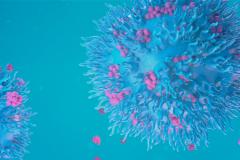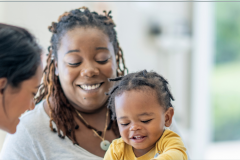A new study published in The Journal of Infectious Disease examined how the COVID-19 pandemic may have changed women’s and children’s immunity to respiratory syncytial virus (RSV).
RSV during the COVID-19 pandemic
RSV is a viral infection that affects the lower respiratory tract and can cause serious illness and death in young children. In a typical (pre-pandemic) year, Canada would expect to have around 20,000 cases of RSV. But in the winter of 2020-2021, the disease virtually disappeared, with only 239 positive cases reported.
However, since pandemic-related public health measures were relaxed, the number of RSV cases have sharply increased.
“We are seeing more than double the number of reported cases of RSV this year than any of the three years prior to the pandemic,”
says Dr. Pascal Lavoie. “The off-season resurgence in seasonal respiratory viruses potentially poses a threat to vulnerable infants.”

Associate Professor, department of pediatrics, University of British Columbia
In a new study, published in The Journal of Infectious Diseases, Dr. Pascal Lavoie and colleagues at BC Children’s Hospital Research Institute, the University of British Columbia and the Li Ka Shing Institute of Virology in Alberta, suggest that this reduction and sudden re-emergence in RSV may be due to how immunity against the virus works.
“When our bodies are exposed to RSV, the immune system learns to fight the infection with an array of armaments, such as antibodies and specialized immune cells that can remember the virus should it be encountered again. For adults, this immunological memory protects them from repeated exposures, but infants who have not experienced RSV depend on antibodies passed on from their mothers,” says Dr. Frederic Reicherz, a visiting postdoctoral fellow at BC Children’s Hospital and first author on this paper. “As a result of this reduced exposure to RSV during the pandemic, new mothers have had fewer antibodies to RSV which passed on to infants during pregnancy or after birth through their breast milk.”

Postdoctoral fellow BC Children's Hospital Research Institute
The research team measured immunity to RSV by collecting blood samples from women ages 18- to 51-years-old and infants in the early stages of the pandemic (May–June 2020) and a year later (February–June 2021).
By comparing these serum samples, the team found there had been a significant reduction (15-fold lower) in anti-RSV antibody levels in the infants sampled in 2021 compared to 2020, and 12-fold lower levels in women.
“These results suggest that infants born during the pandemic may be more susceptible to RSV at an older age because their early months occurred during historically low levels of RSV,” says Dr. Lavoie.
“Clinicians should be particularly vigilant during this period until RSV immunity levels are restored.”




